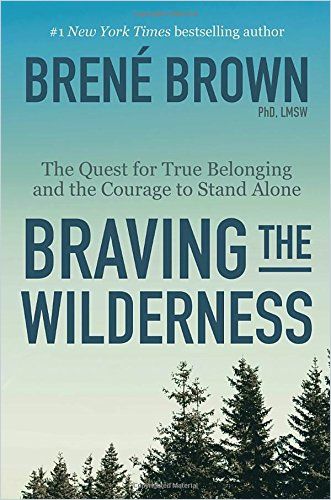Brené Brown, the guru of vulnerability and self-acceptance, explains how to honor and maintain the inextricable links among all people – including you.

Your True Self
New York Times best-selling author and University of Houston professor and researcher Brené Brown studies courage, shame, vulnerability and empathy. One of her TED Talks, The Power of Vulnerability, has garnered more than 30 million views.
Our call to courage is to protect our wild heart against constant evaluation, especially our own.Brené Brown
Brown’s guidebook reaches out to people who want to belong to themselves while connecting with others. Feeling like an outcast, she says, is such an unpleasant experience that most people go to great lengths to avoid it, especially for a second time. Yet, she urges you to find the courage to stand up for what’s right, even at that cost, and to emerge with renewed faith in the inextricable links connecting all people. Brown provides the language to talk about such experiences, and her trademark mix of compassion and tough love makes her a relatable storyteller.
The Huffington Post wrote, presciently, that Brown’s “research and work have given us a new vocabulary, a way to talk with each other about the ideas and feelings and fears we’ve all had but haven’t quite known how to articulate…” Publishers Weekly summed up Brown accurately by saying, “With a fresh perspective that marries research and humor, Brown offers compassion while delivering thought-provoking ideas about relationships – with others and with oneself.”
Not Belonging
Brown understands that not belonging is painful, particularly when people feel that they don’t belong to their own families. Children who sense they don’t belong create lonely internal narratives in which they deem themselves unworthy of love and inclusion. Seemingly small events take on massive importance in such a person’s life. Trivializing your own pain by dismissing your injuries, Brown reveals, makes you less capable of empathizing with others. Instead, accept yourself as valuable.
Wilderness
Experiencing true belonging, Brown writes, means sharing your authentic self. Often, people come to discover and accept their true self in a kind of symbolic or metaphorical wilderness, often portrayed in literature as a place for a physical or spiritual quest, replete with challenge, danger, healing and contemplation. Stepping into this wilderness requires standing up for your beliefs, despite scrutiny and rejection. Belonging to yourself, the author asserts, means maintaining your authenticity, sense of trust and vulnerability.
Dehumanization
People are deeply social creatures who, as Brown makes clear, have strong inhibitions against harming other people. Being harmful to others means overcoming these inhibitions by seeing a group of people as inferior and a threat, and thus unworthy of humane treatment. That is the course of bigotry.
Such dehumanization, Brown notes, starts with losing empathy, trust and the ability to listen to other people. Dehumanization, whether stemming from antipathy to another person’s gender, beliefs, race, national origin or age, enables slavery, genocide, torture and crimes against humanity. Brown laments that history shows that most people are susceptible to the false claims that lead to dehumanization.
Shared Outrage
People who huddle in ideological bunkers, Brown explains, form opinions of the other side without the benefit of personal contact. People with a strong sense of true belonging, she says, refuse to accept blanket judgments and base their opinions on face-to-face experience.
We silence dissent, grow more extreme in our thinking and consume only facts that support our beliefs, making it even easier to ignore evidence that our positions are wrong.Brené Brown
You need contact with people who disagree with you, Brown asserts. Pain and anger can subside only when someone responds to them with compassion. You can convert anger to action, the author advises, but holding onto anger is exhausting and joyless.
Collective Joy
Brown maintains that nothing can sever the underlying links collectively connecting human beings, though people may lose faith in that connection. They withdraw and take refuge in the supposed safety of echo chambers and ideological bunkers.
After a meaningful conversation, two people could actually have increased mutual understanding, greater mutual respect and better connection – but still completely disagree.Brené Brown
Brown advocates renewing your faith in this inextricable connection by seeking collective joy. Shared grief also can uplift, as at funerals and after natural disasters or other tragedies. A shared experience, the author believes, reaffirms each individual’s belief in connection and heals spiritual crises.
Strength
If you succumb to fear, Brown discloses, you will present a hardened face to the world, giving the appearance of strength while guarding your secretly weak back. An armored front may protect you from pain, Brown insists, but it cuts off joy, trust and intimacy.
Vulnerability, the author discovered, is like a muscle that strengthens with practice. She encourages you to embrace joyful moments while recognizing and fighting injustice. Gratitude, Brown believes, brings joy. Some people make it their full-time job to search the world for proof that they’re being rejected or don’t belong. If you look for that proof, Brown reminds you, you will always find it.
Common Humanity
Brené Brown proves, as ever, the model of common humanity, generous insight and evolved understanding. Her thoughts seldom veer into New Age slogans or superficialities. Her consistent message is that every person – including yourself – is in pain and vulnerable to the judgments of others. She insists that everyone wants community, though some people subscribe to negative viewpoints to find it. Brown describes this process and suggests ways to avoid the pitfalls that loneliness and alienation bring. Reading her words is cheering and encouraging. Her thoughtful, compassionate approach communicates her crucial, fundamental idea: You are not alone.
Brown’s other works on compassion and vulnerability include The Gifts of Imperfection, Daring Greatly, I Thought It Was Just Me, Rising Strong and Dare to Lead. Another work whose themes align with Brown’s is You Are Your Best Thing by Tarana Burke.







